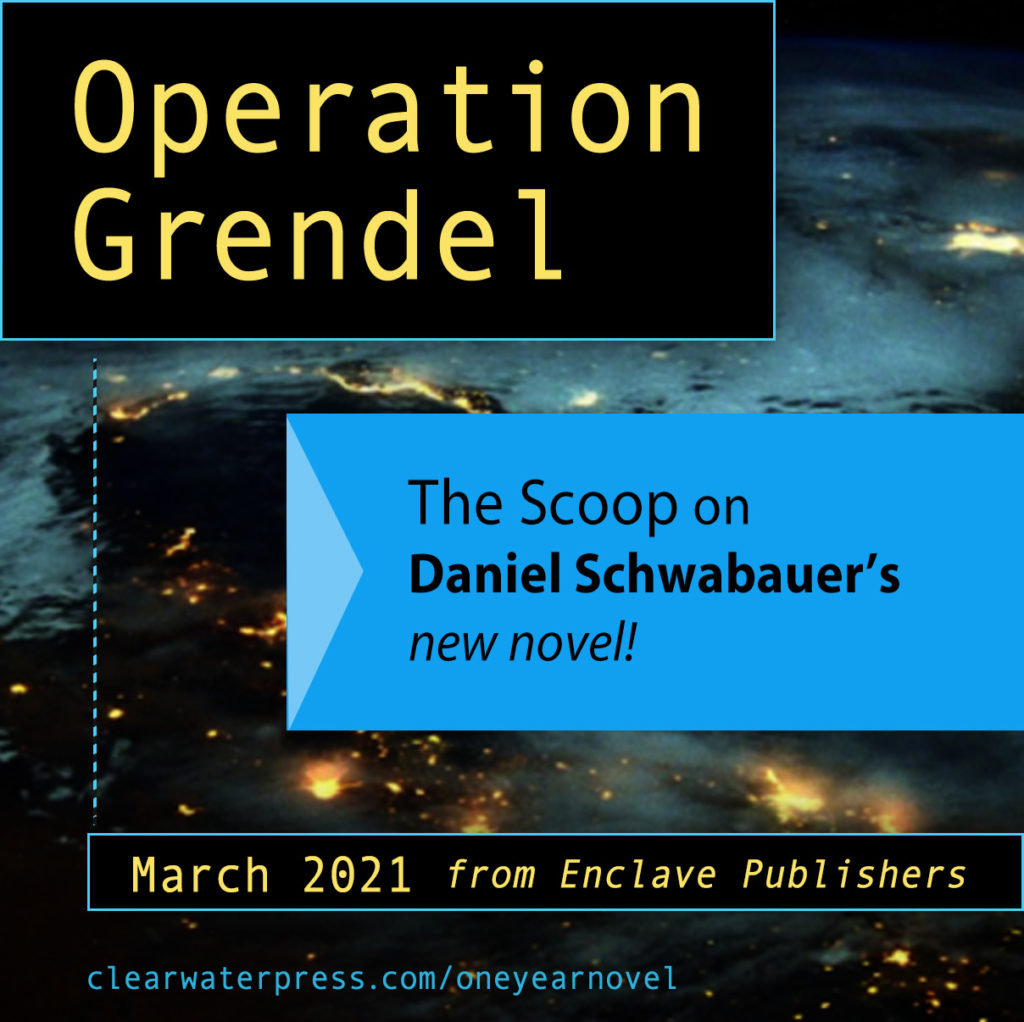Operation Grendel: The Scoop on Daniel Schwabauer’s New Novel

Daniel Schwabuer’s military sci-fi novel, Operation Grendel, has been picked up by Enclave Publishing! It will be released as a limited-edition hardcover in March 2021, with the paperback slated for December.
The novel tells the tale of military journalist Raymin Dahl, who thinks he’s finally getting the story of a lifetime. Envoys to secret peace talks on a remote tropical moon are about to surrender five colonized worlds—and six hundred million civilians—to a ruthless enemy.
But when his commanding officer is fatally wounded before the negotiations can begin, Dahl is told to do more than just report on the mission; he’s ordered to complete it. With the help of the AI embedded in his new comms bracelet, Dahl must impersonate Captain Ansell Sterling, Marine Corps hero and psychological operations expert.
Problem is, Sterling’s AI may be luring him to surrender more than he realizes. And the mission Dahl thinks he’s running isn’t the only PSYOP under way.
Corporal Dahl may get the great war story he’s dreamed of, but it could be his last!
Want to be on the Operation Grendel street team? Scroll below the interview for details.
Emily “Harpley” Steadman Interviews Daniel Schwabauer
Lightly edited for clarity
Daniel Schwabauer (affectionately known by his writing students as Mr. S) was kind enough to sit down and answer a few questions regarding the novel as we draw nearer to the much-anticipated release date!
What inspired you to write Operation Grendel?
When I was creating Byline, my curriculum for high school essay writing, I did a lot of research into 19th century journalism. I noticed a correlation between the yellow journalism of the end of the 19th century and what I think I see happening in journalism today. That fascinated me, so I started researching propaganda and how it works and noticing the correlation between journalism and propaganda. Almost every major propogandist in history started out as a journalist. I think it’s because the inverted pyramid structure of journalism fits really well with propaganda. If you master that structure, you can master propaganda really well.
I was also researching fairytales for a period of time while I was writing this story, and I didn’t realize until I wrote the epilogue for Enclave this May – a year and a half after I finished the rough draft – that what I was really doing was pulling from themes in Hansel and Gretel. It’s not like you’ll read it and then go, “Oh, that’s Hansel and Gretel,” but if you really study the original Hansel and Gretel, you’ll see some of the same themes in it.
Anyway, that’s a long answer to it – probably just studying journalism and propaganda and loving science fiction and reading a lot of military sci-fi is the simple answer.
Does one of the characters hold a special place in your heart? If so, why?
That’s hard to answer. I really like these characters. I think probably the reporter (Raymin) holds the dearest place in my heart in a weird way, because I want him to come across as sympathetic even though he’s not necessarily sympathetic all the way through the novel. He wants the story and everything else is less important than the story. He’s got all these flaws and he’s compromised, and there’s a part of me that thinks that there’s kind of a noble calling to what he’s doing. Even though the book isn’t really nice to reporters. [Laughs.] Hopefully that flavor kind of gets turned on its head a little bit as the story resolves; there’s some more good vibes towards journalists there. I don’t want to make anybody out to be black and white – that’s not in the story at all; there are a lot of shades of grey.
What would you say the hardest part about writing Operation Grendel was?
For me the hard part was coming to terms with its weaknesses.
My first drafts were all basically plot-based. They were based on this idea that I had as I was outlining and writing the plot twist. And I loved the plot twist so much that I lost sight of who the characters were. So I had to set it aside and think about it and pick it up again a year after I initially finished it and start it over.
I rewrote every chapter and I added four more chapters – about twenty-five thousand words – to the story. And those words were all an exploration of the major characters. No book is perfect; certainly, no book I write will ever be perfect. But that fixed the main thing that was bugging me about it. Letting myself see it as flawed, and that I didn’t really know the characters or who they were or why they were doing stuff – that was hard, making myself confront that reality. Once I did that, it was easy to write. Those twenty-five thousand words were the hardest to get to, but they were easiest part of the story to write once I admitted I didn’t know my own characters.
What was a highlight of writing Operation Grendel?
Probably the main highlight was when I got to a certain point and realized that the plot that I’d outlined was not as good as the idea I had when I was about two-thirds of the way done with the rough draft. I had another idea, and it was so interesting to me that it made the rest of the book fun. I don’t feel like I was “inventing” the story as much as I was digging for something, and I thought I was digging a well and instead found a gold mine. But I can’t say what it is, or it’ll ruin the book. [Laughs.]
This is your first military science fiction novel – what challenges did you face when writing this genre?
The first one was just the general insecurity of “will people buy this military atmosphere that I’m setting up?” That’s partly why I wanted to write it from the perspective of a journalist. So that was the first thing; realizing that I’ve never been in the military and I don’t know if people will buy this. And then trying to figure out what details I can put in that are military-specific that I can make real to people who are in the military—that I can get past them without them saying “This author has never been in the military.” I don’t know if I succeeded or not; I think I’ll find out after it’s published.
There was a lot of research that was fun. There’s a couple of jodies in the book – a jody is like a marching song. I had fun exploring what jodies might be like in a futuristic setting in this world – because the atmosphere of AIs and everything is going to change some things, but not everything. Being a soldier is still going to be the same in many ways.
Could you describe a typical writing day?
I don’t usually have the personal ability or schedule opening to write for a whole day. Usually I write at certain times of the year; when I have more “free time,” so to speak, to do that. I will try to spend anywhere from two to five hours – generally it’s closer to three and a half or four – trying to produce one thing. So it might take me two or three days to write a novel chapter. Sometimes I can do it in one day. Then other things that are part of writing such as revision or marketing stuff – as a writer, those are part of your job, but I don’t consider them “writing.” I probably do that five to six months out of the year, and then everything else is wedged in here and there – I’ll get a few days to do a chapter or something. I can’t just write year-round because of workshops, business, and sales season.
If you had the opportunity to speak with Raymin Dahl, what would you say?
Now I just have J. K. Rowling’s answer to that question in my head: “I’d tell him I’m sorry for everything I put him through.” * I don’t know… the simple answer is probably “You’re wrong.”
* Quoting what J. K. Rowling replied to a similar question in a live TV interview Daniel watched years ago.
If you could tell your younger writing self anything, what would it be?
Read more and write more, slacker! [Laughs] Not “believe in yourself,” but “it’s going to pay off.” I would be farther along if I had done more earlier, if I had studied a little bit more. I look at my shelves and I go “Well, I’ve read a lot. But I could have three times as many shelves full of things that I’ve studied.” I could have gone to more conferences; I could have done more. I don’t live with any kind of guilt over that, it’s just if I could give myself advice, it would be that.
Thanks very much, Mr. S!
If you’re interested in updates regarding Operation Grendel, follow Mr. S’s Instagram, @daniel.schwabauer!
…
Want to be on the street team for Operation Grendel?
Mr. S is looking for volunteers to participate in the cover reveal for Operation Grendel! The idea is to drum up pre-orders, which open up as soon as the cover is revealed. Right now the cover is top secret. His agent sent him a preview, but he’s not allowed to show it to anyone. Enclave Publishing will release the cover image on September 22, and that’s where you come in… if you’re interested!
If you have an Instagram account or Facebook account, and are willing to share the cover image on September 22, just fill out this simple form. Enclave will send the pictures and descriptions one week in advance, on September 15, to the email address you provide. You’ll have a week to schedule a post, but please don’t share the image before September 22. Thank you!



This sounds great! =D
I was just curious if this book was the result of the medieval cyberpunk Mr. S was working on or if this was a totally different subject. ^_^ Just wanted to be sure.
Congratulations on getting your book published, Mr. S!!! 😀
Thank you!
Re: whether it’s a medieval cyberpunk novel — No, this is straight up military science fiction. Futuristic journalism/combat/psychological warfare. It almost crosses into psychological thriller territory, except that it’s all in the future and not set on earth.
Thanks for your interest in it!
Is this the same story you talked about a little bit at SW 2K19?
I remember being very excited about this novel then, and i’m just as excited, if not more, now that i’ve read this.
Congrats on getting it published, either way!
Hi Zack,
Yes, this is the novel I read the first page from at the 2019 SW. Thanks for the kind words! 🙂